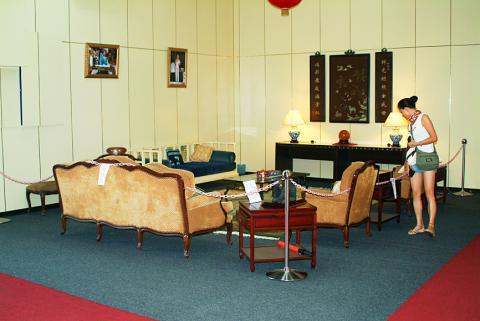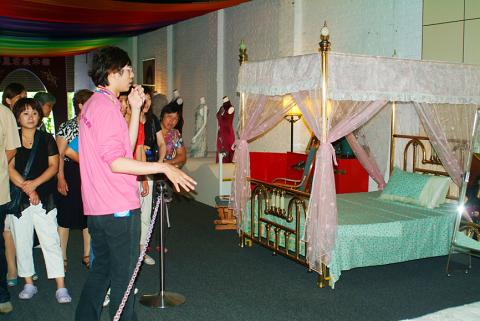Arriving at the first ever museum dedicated to Teresa Teng (鄧麗君),
the 20th century’s best-known Mando-pop singer, I couldn’t help but feel surprised.
It’s not located in central Kaohsiung City or even a business, commercial or artsy district as one might expect, but amid a group of warehouses along a section of Kaohsiung’s Love River with few shops or other businesses.

Photo Courtesy of Today Color
The only thing that sets the building apart from the other warehouses is its white walls — and the row of tour buses parked outside.
Perhaps even more surprising is just how far most of the museum’s visitors have come to see it. Since The Teresa Teng Memorial Hall (鄧麗君紀念文物館) opened in April this year — 15 years after the singer’s death from an asthma attack in 1995 while on vacation in Thailand at the age of 42 — it has seen 600 to 700 visitors a day. More than 90 percent of them come from China, according to Teng’s eldest brother, Teng Chang-an (鄧長安), who set up the site.
Huang Yan (黃燕), a 39-year-old tour guide from Shanghai, said she never tires of listening to Teng’s songs or watching her videos, even though she hears them repeatedly on the tour buses.

Photo Courtesy of Today Color
She remembers a time in China when Chinese Communist Party officials told people not to listen to Teng’s songs because she was from Taiwan, the “renegade province.”
“But in the early 1980s, we secretly listened at home. Even though they banned her songs, there were people who would secretly listen,” Huang said. “As far as I know, no one actually got in trouble for it. The officials also liked her songs. It was just politics, because she was from Taiwan. They said her lyrics would have a negative influence, but that was all nonsense.”
On a recent visit, tourists of all ages streamed into the museum with excited looks on their faces — seemingly oblivious to the strange warehouse setting — as they were led into a room where they intently watched a video about Teng’s early years.
Her father was a military man, and after the Kuomintang (KMT) lost the civil war to the Communists, he moved to Taiwan. His daughter showed talent for singing from a young age, charming families in the military village where she grew up. Her father, recognizing her potential, agreed to let her drop out of high school and pursue a career as a professional singer.
The walls of the 250-ping (825m2) museum are decorated with pictures, large and small, of Teng. A wide assortment of items from Teng’s personal life are on display, ranging from a Mercedes Benz she bought in 1994, a year before her fatal asthma attack, to large glass cases of her on-stage jewelry, mannequins dressed in her glamorous dresses, and even a mahjong table.
“Teresa Teng’s mother loved to play mahjong. Despite her busy schedule, Teng still found time to play mahjong with her mother,” the tour guide said.
The last stop is the souvenir shop — oddly, the only place in the museum where visitors can hear Teng’s music. A large TV continuously plays DVDs of her performances. There’s even a shimmering disco ball. With her most famous and popular songs playing — including Small Town Stories and The Moon Represents My Heart — it’s easy for fans to linger.
And that’s exactly what a small group of Chinese tourists did: They watched the DVD quietly, paying no attention to the gift items or their fellow tourists.
A tourist from Xi’an, China said there was only one way to explain why she loves Teng’s songs: “They’re beautiful.”
“I first heard her songs in the early 1980s when I was in my 20s. I was just starting to work. I thought her songs sounded great, her voice was so gentle and beautiful. I’ve liked her ever since then. Her voice is very unique,” Xu Min (徐敏) said.
She added: “I feel so touched being here. In the 1980s, even though we knew she was from Taiwan, we thought she was one of us, like a family member.”
Another tourist said Teng’s songs cheer people up.
“Her songs make me feel light-hearted, even now. They make me feel better,” said Li Cong (李琮), 40. “When we go to karaoke bars, we often sing her songs.”
Teng was the first person of Chinese descent to perform at the Lincoln Center and the first Asian woman to perform at Caesar’s Palace in Las Vegas, but her brother believes that it is the working class, people with hard lives, who appreciated her songs the most.
“They were often played in work places, easing the pressures of work,” Teng Chang-an said.
Her songs were of particular import to those living in China. “They had just come out of the Cultural Revolution, listening to revolutionary songs,” he said. “Her songs were like a breakthrough for them.”
“Some government agencies and private entrepreneurs wanted to open a memorial hall for the performer, but ... we didn’t want it to be commercialized. So we decided to open the memorial hall with our own funds,” Teng Chang-an said. “We’re not so concerned about making a profit. This is to fulfill her dream of contributing to society.”
He admitted the museum is not adequate and said he hopes to do better.
“I hope to raise enough money in three years to build a permanent memorial hall so that her spirit and songs can be passed down to future generations,” he said.

William Liu (劉家君) moved to Kaohsiung from Nantou to live with his boyfriend Reg Hong (洪嘉佑). “In Nantou, people do not support gay rights at all and never even talk about it. Living here made me optimistic and made me realize how much I can express myself,” Liu tells the Taipei Times. Hong and his friend Cony Hsieh (謝昀希) are both active in several LGBT groups and organizations in Kaohsiung. They were among the people behind the city’s 16th Pride event in November last year, which gathered over 35,000 people. Along with others, they clearly see Kaohsiung as the nexus of LGBT rights.

Jan. 26 to Feb. 1 Nearly 90 years after it was last recorded, the Basay language was taught in a classroom for the first time in September last year. Over the following three months, students learned its sounds along with the customs and folktales of the Ketagalan people, who once spoke it across northern Taiwan. Although each Ketagalan settlement had its own language, Basay functioned as a common trade language. By the late 19th century, it had largely fallen out of daily use as speakers shifted to Hoklo (commonly known as Taiwanese), surviving only in fragments remembered by the elderly. In

Dissident artist Ai Weiwei’s (艾未未) famous return to the People’s Republic of China (PRC) has been overshadowed by the astonishing news of the latest arrests of senior military figures for “corruption,” but it is an interesting piece of news in its own right, though more for what Ai does not understand than for what he does. Ai simply lacks the reflective understanding that the loneliness and isolation he imagines are “European” are simply the joys of life as an expat. That goes both ways: “I love Taiwan!” say many still wet-behind-the-ears expats here, not realizing what they love is being an

In the American west, “it is said, water flows upwards towards money,” wrote Marc Reisner in one of the most compelling books on public policy ever written, Cadillac Desert. As Americans failed to overcome the West’s water scarcity with hard work and private capital, the Federal government came to the rescue. As Reisner describes: “the American West quietly became the first and most durable example of the modern welfare state.” In Taiwan, the money toward which water flows upwards is the high tech industry, particularly the chip powerhouse Taiwan Semiconductor Manufacturing Co (TSMC, 台積電). Typically articles on TSMC’s water demand